With the breaching of the ancient Wall that spans the northern frontier of the Seven Kingdoms, the realms of men are facing another Long Night.
The supernatural White Walkers and their undead army are shambling southwards through an Eastwatch-by-the-Sea sized gap in the no-longer impassable barrier, and if the old stories are to be believed, things look dire for Westeros.
But just how dire might the situation be? Probably pretty dire. If only we could hear the opinions of the First Men from thousands of years ago.
*Before we get any further into this article, this is going to be speculation about what could happen in regards to the White Walkers invasion of Westeros. I’ve been avoiding reading details from the production so I could write this post in a spoiler-free manner, so if you, dear reader, are trying to avoid confirmed plot details you won’t find any here. You’ll just find my guesses. If you are deep into the spoiler weeds already, do me a favor and don’t include any such details in the comments. Not for my benefit so much, but for anyone else reading along.*
First Man #1: You young people today don’t know how easy you’ve got it.
First Man #2: Aye, we had it rough!
Most of our information from the Long Night comes as stories from Old Nan of Winterfell. The story of the White Walkers is slightly abbreviated on the show, so here’s the relevant passage from the books:
“Thousands and thousands of years ago, a winter fell that was cold and hard and endless beyond all memory of man. There came a night that lasted a generation, and kings shivered and died in their castles even as the swineherds in their hovels. Women smothered their children rather than see them starve, and cried, and felt their tears freeze on their cheeks.”
“In that darkness, the Others came for the first time” she said as her needles went click click click. “They were cold things, dead things, that hated iron and fire and the touch of the sun, and every creature with hot blood in its veins. They swept over holdfasts and cities and kingdoms, felled heroes and armies by the score, riding their pale dead horses and leading hosts of the slain. All the swords of men could not stay their advance, and even maidens and suckling babes found no pity in them. They hunted the maids through frozen forests, and fed their dead servants on the flesh of human children.”
— A Game of Thrones, Bran IV
The northmen of Westeros have at least one advantage missing from the First Men who saw the last round of the merciless walking dead – the people of the North are somewhat prepared this time.
If we take Nan’s story as more-or-less correct (we don’t have to have 100% faith in it, but let’s take it as close to authoritative for the moment) the White Walkers came as a surprise. It was the first time. And the people they encountered were not united in purpose. There were multiple kingdoms affected, and the undead hosts defeated armies plural. A score of armies. (Those not up on archaic counting words, a score is usually twenty, but don’t take it too literally.)
Wait, if the undead swept through kingdoms, does that mean they ripped through the North and down into the Riverlands? Well, maybe they did, but not necessarily. This happened before the Starks became the Kings in the North; there were multiple smaller kingdoms throughout the land.
Depending on if the climate generally was more temperate before the Long Night, there might even have been holdfasts and smallish kingdoms in the lands now north of the Wall. We know that the First Men had a settlement or outpost in the far, far north, at the Fist of the First Men. But that’s a point I don’t need to debate one way or the other. There were multiple kings in the North at this time, and these kings probably behaved like most kings do, prioritizing responses to problems when those problems were closer to their doorsteps, instead of rushing to their neighbor’s aid.
At least the contemporary North has been expecting winter, perhaps symbolically, for some time. The northmen are used to cold weather and have been stockpiling for multi-year freezes. That puts them in a better position than their ancestors.
First Man #1: Oh, we used to dream of having food stockpiled for multi-year freezes.
First Man #2: We did?
We’ll see if the logistical organization of the North, along with whatever advance warning they get about the Wall’s breaching, gives them the ability to respond effectively to the White Walkers. It’s certainly better than being caught completely unaware.
So is the situation dire? The ancient First Men somehow managed to survive after being caught flat-footed, but it was a traumatic enough of an event for them to build the huge Wall for persistent defense and vigilance. Had the White Walkers been easily repelled at the time, there wouldn’t have been a need for the unbelievably massive engineering challenge. So how did that even happen? How were the White Walkers fought off?
The legends are thin on the actual details that ended the Long Night. We hear this from Old Nan:
“Now these were the days before the Andals came, and long before the women fled across the narrow sea from the cities of the Rhoyne, and the hundred kingdoms of those times were the kingdoms of the First Men, who had taken these lands from the children of the forest. Yet here and there in the fastness of the woods the children still lived in their wooden cities and hollow hills, and the faces in the trees kept watch. So as cold and death filled the earth, the last hero determined to seek out the children, in the hopes that their ancient magics could win back what the armies of men had lost. He set out into the dead lands with a sword, a horse, a dog, and a dozen companions. For years he searched, until he despaired of ever finding the children of the forest in their secret cities. One by one his friends died, and his horse, and finally even his dog, and his sword froze so hard the blade snapped when he tried to use it. And the Others smelled the hot blood in him, and came silent on his trail, stalking him with packs of pale white spiders big as hounds—”
Bran’s story gets interrupted unfortunately by Hodor. Our only clue to the end of the story is literally a reference that the story has an end…
All Bran could think of was Old Nan’s story of the Others and the last hero, hounded through the white woods by dead men and spiders big as hounds. He was afraid for a moment, until he remembered how that story ended. “The children will help him,” he blurted, “the children of the forest!”
— A Game of Thrones, Bran IV
The First Men during the long night were saved somehow when the Last Hero made contact with the Children of the Forest. It’s good to know that the White Walkers can be stopped with some assistance from the Children, but those elfin inhabitants of ye olde Westeros appear to be in short supply now. The last we’ve seen died defending Bran in a cave in the uttermost north.
But Bran Stark, the new Three Eyed Raven, is situated in Winterfell and is focused on stopping the White Walkers. We’re not really sure how he’ll do that. We’re not sure if Bran is sure how he’ll do that. While Bran is moving along his mystical magical journey, the men of the North will have to rely somewhat on their military might.
I think it’s fair to say that the current defenders of humanity have some martial advantages over their ancient counterparts.
“On his head was the sword crown they had fashioned him of bronze and iron.”
When the White Walkers came the last time, the First Men faced them mostly with weapons of bronze. I’m not saying that iron-working was beyond the First Men, but the books really lean heavily on the Andals being known for bringing their superior iron working to Westeros. Since the Andal invasion was thousands of years after the Long Night, bronze was probably the more common material in use.
Wait. Didn’t Old Nan say in her story that the White Walkers hated iron and fire? Why wouldn’t she say bronze and fire?
This is one of those details that I think Nan has under-researched for her stories.
Old Nan: Thanks for mansplaining this to me.
The current defenders of the Seven Kingdoms have the benefit of steel, which is superior in general to bronze, and functionally more economical since iron and carbon sources are plentiful while tin and copper, the source metals for bronze, are not. This might give the contemporary men of the North a slight advantage in performance over their bronze-using predecessors, but mundane weaponry has such little effect on wights that the steel advantage in weaponry is probably negligible. I’ll come back to this a little later.
One of the two big advantages in weapons technology is the discovery that obsidian (called dragonglass or poetically ‘frozen fire’ in Valyrian) is dangerous to the White Walkers and disruptive to the necromantic energy that animates the wights. Jon Snow brokered a deal with Daenerys Targaryen to mine the vast collection of obsidian found in the caves beneath the Valyrian fortress of Dragonstone, so thanks to their alliance, obsidian is being ferried to craftsmen in the North to shape into usable weaponry.
To restate the good news: dragonglass kills White Walkers and wights. The bad news: epipaleolithic technology doesn’t necessarily make for great weaponry. Stone weapons are heavy compared to metal, are brittle, can shatter, and might not penetrate the armor that the White Walkers began to wear shortly after Sam Tarly stabbed one of the unarmored, ancient monsters with an obsidian dagger.
They’ll probably be best used for arrowheads since there will be so many wights to shoot at. Like, so many wights. And shaped into spearheads since spears are easy to produce and train people to use en masse.
The other key weapons technology that was largely absent during the first Long Night is Valyrian steel. Technically it wasn’t available at all during the Long Night since that time predated the rise of Valyria, but Sam Tarly discovered references to dragonsteel, which could kill White Walkers.
“The armor of the Others is proof against most ordinary blades, if the tales can be believed,” said Sam, “and their own swords are so cold they shatter steel. Fire will dismay them, though, and they are vulnerable to obsidian.” He remembered the one he had faced in the haunted forest, and how it had seemed to melt away when he stabbed it with the dragonglass dagger Jon had made for him. “I found one account of the Long Night that spoke of the last hero slaying Others with a blade of dragonsteel. Supposedly they could not stand against it.” — A Feast for Crows – Samwell I
This ‘dragonsteel’ seems to refer to some ancient forerunner of the excellent weaponry of the Valyrians, since Jon Snow discovered at Hardhome that his sword Longclaw did not shatter in contact with the weapons of the White Walkers, and kills them as explosively as dragonglass.
It would be fantastic if the Stark/Targaryen coalition had in their armories a plentiful assortment of arrows, swords, lances, and spears of the dark-as-smoke Valyrian steel. But the secret of forging this alloy vanished when the Doom took Valyria, and our plucky heroes will have to make due with what few Valyrian blades they have.
Jon: I have one.
Brienne: I have one.
Arya: I have an itty bitty one!
Jaime: I have one! Can I help? I’m a good guy now!
Bran: I’ll have to think about that, Kid-dropper.
Since I’m counting swords, it might be reasonable to estimate army sizes. Dany came to Westeros with her starting force of eight thousand Unsullied. Some died during her tenure in Meereen, some were lost taking Casterly Rock, but her number of Unsullied is probably still close to that number.
Daenerys also brought with her an enormous group of Dothraki cavalry, after cowing the khalasars by roasting the khals and surviving an inferno unsinged. I think it’s fair to say she could have tens of thousands of horselords from Essos.
At Winterfell, Sansa Stark has the loyalty of the knights of the Vale, heavy cavalry that I think number around five thousand. Enough to carve through Ramsay Bolton’s alliance with the Karstarks and Umbers at the Battle of the Bastards.
Jon Snow relied on two thousand wildlings previously, and now that the Boltons are out of the picture and the North has rallied around Jon as king, thousands of northern soldiers are available. The number of available fighting northmen has been unfortunately depleted by two events: the butchery of Robb Stark’s host at the Twins by Bolton and Frey treachery, and the defeat of the Bolton, Umber, and Karstark forces outside of Winterfell. The fighting forces of every house in the North has taken a hit in the past years, regardless if those houses were virtuous or villainous.
On the other side is the army of the White Walkers. At most we’ve seen around a dozen of the supernatural bogeymen (doesn’t mean we can’t see more) but at a low estimate there are over one hundred thousand wights in their army. It’s fair to suggest that the bulk of Mance Rayder’s failed migration population were killed and converted into foot soldiers. Their army includes undead giants, and maybe we’ll see more ghoulish polar bears in the mix.
These numbers are all fuzzy of course, but it feels like the White Walkers have at least a three-to-one numerical advantage over the North in the most favorable case for the humans. Because of dramatic narrative stakes, it’s probably more like ten-to-one.
If this was a normal military situation, the defenders would be wise to get behind their walls.
“One man on a wall was worth ten beneath it.”
Ned Stark and Tywin Lannister probably didn’t see eye-to-eye on some things, but according to the books they both agreed that castle walls were a force-multiplier. Since the defenders of the North are outnumbered, perhaps they can even things up by sticking to a defensive game.
But things are still unbalanced in the White Walkers’ favor. They don’t need to eat or rest. They really have no supply lines that can be cut. The wights are their own supply line, with their slain enemies joining the army of the indefatigable undead. They can mount round-the-clock assaults. They’ll rush at walls in the face of boiling oil and arrowfire fearlessly.
The defenders inside have positional advantages, but run the risk of exhaustion in the face of sustained assaults. In these situations, the offense only needs to get lucky once to be successful. I’m sure any Unsullied manning the walls would give their all, but they’re only human.
Grey Worm: Unsullied can fight without food or rest.
Me: Really? For how long?
Grey Worm: Grey Worm was just repeating some promotional material from the Astapor wise masters. Don’t take everything Grey Worm says literally.
It’s expected that the North will shelter the smallfolk in their castles and fortifications. Undefended populations wouldn’t just be targets for attack, they’d be at risk of necromantic recruitment; there’s no incentive for the lords to try and keep the locals out. Non-combatants behind the walls would therefore have to be accommodated for and fed. Sansa Stark was expecting a great many refugees to head to Winterfell, and so had requisitioned harvested stockpiles, but the North will need some other strategy to employ than just waiting things out. The dead are excellent at playing the waiting game.
“He set out into the dead lands with a sword, a horse, a dog, and a dozen companions.”
We don’t have a great deal of information on how sophisticated First Men cavalry might have been during the first Long Night. The Andals are typically credited with introducing armored chivalry to Westeros, but if we believe Old Nan’s tale about the Last Hero, horses were domesticated prior. And the White Walkers set themselves apart from their shambling rabble by riding their dead horses.
The critical factor would be if stirrups had been invented at the time, which is necessary for serious mounted combat, particularly horse-archery.
So the White Walkers might not be anticipating advanced cavalry techniques from their human opponents. But the knights of the Vale won’t be accustomed to infantry not routing when charged into.
The northern combined cavalry are outnumbered in relation to the wights, but we saw Stannis Baratheon’s mounted forces carve up a numerically superior force of wildlings, so I don’t want to downplay the effectiveness of horses. But the Dothraki have had negative experiences with infantry that didn’t break when charged into. In the books, we get details of a khalasar facing off against fearless, unflappable foes.
Ser Jorah Mormont recounts a tale of three thousand Unsullied who stood their ground at the city of Qohor against what should have been overwhelming numbers of Dothraki.
“But when dawn broke and Temmo and his bloodriders led their khalasar out of camp, they found three thousand Unsullied drawn up before the gates with the Black Goat standard flying over their heads. So small a force could easily have been flanked, but you know Dothraki. These were men on foot, and men on foot are fit only to be ridden down.
“The Dothraki charged. The Unsullied locked their shields, lowered their spears, and stood firm. Against twenty thousand screamers with bells in their hair, they stood firm.
Eighteen times the Dothraki charged, and broke themselves on those shields and spears like waves on a rocky shore. Thrice Temmo sent his archers wheeling past and arrows fell like rain upon the Three Thousand, but the Unsullied merely lifted their shields above their heads until the squall had passed. In the end only six hundred of them remained . . . but more than twelve thousand Dothraki lay dead upon that field, including Khal Temmo, his bloodriders, his kos, and all his sons. On the morning of the fourth day, the new khal led the survivors past the city gates in a stately procession. One by one, each man cut off his braid and threw it down before the feet of the Three Thousand.
— A Storm of Swords, Daenerys I
It’s quite possible that the wights have anxieties and neuroses or whatever, obviously I haven’t talked to one to find out, but I assume that they are fearless in the classical way that undead happen to be fearless. Mindlessly so. (When not being confronted with Dungeons and Dragons clerics wielding holy symbols, of course.)
The wights won’t care about the Dothraki’s reputation and they won’t rout under arrow fire. Even if the arrows are tipped with stone dragonglass points (which they had better be.)
The knights from the Vale have the benefit of steel armor and so they’ll have a better chance surviving close contact with the wights than the average leather vested Dothraki.
Rakharo: Dothraki don’t wear steel dresses.
Ser Jorah: Armor.
Rakharo: Armor. Armor make a man slow.
Ser Jorah: It’s true. It also keeps a man alive.
Rakharo: My father taught me how to fight. He taught me speed defeats size.
Ser Jorah: We’re entering Season Eight and I’m still alive. Didn’t you die early in Season Two?
Rakharo: No need to get all meta-referential on me, Jorah the Andal.
Regardless if it is heavy Vale cavalry or the more numerous Dothraki light cavalry trying to scatter the wights, the horsemen will become the focal point of surging murderous corpses once the initial impact is complete.
That’s assuming that cavalry charges will even be effectively possible. With the White Walkers comes bad weather. Really bad weather.
Deep snowfall would reduce the speed and maneuverability of the horses, as well as concealing any holes and other hazards in the terrain. I suspect that the Dothraki of Essos are not used to snow, nor their horses (does anyone have any evidence in the text of Essos having bad winters like Westeros? I’ve always assumed that it is only Westeros that suffers sustained climactic issues, but some of that might be because the entirety of the continent of Essos is south of the Neck’s latitude, and just doesn’t see the colder weather.)
Once winter truly hits, the advantages given by the horses will be reduced. But not the amount that the horses eat.
Stannis: At Storm’s End, we ate the horses.
First Man #1: You had horsemeat? You were lucky!
Still, provided that the northern alliance can keep those horses fed, it’s probably better that they have them than not. But the mundane destriers from the Vale of Arryn and the horses from the grasslands of Essos aren’t nearly as important as a different breed of steed.
The dragons.
A Dance of Dragons, A Detente of Dragons
The First Men (as far as we know) did not have the benefit of dragons in their fight against the White Walkers during the Long Night.
First Man #1: That’s the way we liked it!
And they also didn’t have to contend with undead dragons (only spiders as big as hounds.)
First Man #2: Okay, we were the lucky ones. I’ll admit it.
When Dany had three dragons, it seemed like any bypassing of the Wall by the White Walkers would be easily dealt with via dragonfire. But that was before Viserion was felled by the Night King’s javelin, and resurrected into his service.
Dany’s dragons are still a danger to the army of the wights and Daenerys does have a two-to-one numerical advantage, but the Mother of Dragons is probably somewhat reluctant to put her children in harms way, thanks to what happened to Viserion.
Since the Night King is using Viserion as a ride, he probably won’t be committing his dragon-wight recklessly into action. He only has the one dragon, and if push comes to shove, Dany might make good use of her two dragons to stop him. But push might have to come to shove before that happens.
Because of that, the most obvious course of action for both sides is to act as a dragon deterrent: like the nuclear arsenals between the US and USSR during the Cold War. Both sides have them, so neither side uses them. Unless the other crosses a line. A line each will be watching for.
Because the dragons are such a threat to both sides, I imagine that the Night King will be unlikely to significantly divide his forces. He might send off small groups, with the intention of not attracting the attention of a dragon-riding Dany, but will keep his large army intact for its integrity and security. With one dragon, he can only provide air support for one army. So it is unlikely that the North will find simultaneous major sieges happening.
In fact, I don’t see any incentive for the White Walkers to spend much time in the North at all, dealing with the pesky northmen who were forewarned and forearmed with wight-killing/White Walker destroying weapons.
“That’s more people than the entire North, crammed into that.”
In the Season Seven finale, Tyrion Lannister informed Jon Snow that King’s Landing contained within its limits roughly one million inhabitants, more people than the population of the kingdom of the North.
The Night King could take the steps necessary to depopulate the North and add just under a million soldiers to his army. It would take time, moving his massive army around the kingdom and attacking settlements and fortifications, playing aerial chess with Daenerys riding Drogon with Rhaegal beside her, dealing with feints and skirmishes from knights and Dothraki. Or the Night King could just march south instead.
Due south of the kingdom of the North, past swampy Moat Cailin in the Neck, is the kingdom of the Riverlands. Years of conflict haven’t been kind to the region, it’s not as heavily populated as it once was, but it represents something that the White Walkers haven’t experienced since before the last Long Night: a land not expecting a horde of supernatural monsters.
The Riverlands might not be a collection of small kingdoms, but it can’t be considered unified with Lannister troops trying to keep the loyalty of the smallfolk at sword-point, grumbling river-lords only recently been brought back into obedience to King’s Landing after following the King in the North, bandits in the countryside, and disgruntled religious folk still remembering that briefly there had been a Faith Militant who were going to set things right by the Seven.
Not everyone will be holed up behind strong castle walls, and no one will be holding spears with dragonglass heads. And there will be no army gathered with orders to engage with a shambling horde.
And just a bit farther down the convenient-for-marching kingsroad is densely populated King’s Landing. With one million potential new recruits.
Now, King’s Landing isn’t defenseless, it’s a walled city. But the Westerosi capital nearly fell to Stannis Baratheon who had far less soldiers than the Night King.
Ser Davos: Are you going to let that grammatical error pass, your grace?
King Stannis: I’m inclined to let it go. Technically, my army had fewer soldiers, yes. But the Night King’s wight soldiery are so much more impressive, a human soldier might be considered “less than.”
Could the Night King realistically delay taking the North and instead target King’s Landing for his first major conquest? The White Walkers aren’t a typical army. There aren’t really supply line considerations to limit their ranging. In fact, their biggest threat, the army of the North, would have to stretch a supply line if they wanted to keep pace and harry the undead as they marched into the Riverlands.
The wights are on foot, so they wouldn’t be fast, but they don’t have to stop and make camp. Ever. And no one else will be moving all that fast now that winter has come.
But how would the Night King even know to head south, know that there would be a relatively easy jackpot at the end of the road?
I think it’s a reasonable question and can generate some good discussion, but I don’t think it’s a question that demands an answer. The Night King is supernatural. If the show doesn’t give us any explanation, I’d just chalk it up to magical greensight or that he’d been sending undead crows flying south for years to inform his plans.
He might have gotten information from the dead minds of his servants. In Season One, when the dead Night’s Watch rangers Othor and Jaffer Flowers reanimated at Castle Black, Othor headed straight for the Lord Commander’s quarters. One implication is that some of Othor’s knowledge remained intact in the walking corpse, which suggests the possibility of being able to provide some kind of minimal intel to the White Walkers.
There might be a more mundane explanation. Rangers of the Night’s Watch often made stops at Craster’s Keep deep in the haunted woods when wanting to trade or to exchange information or just to get warm. Who knows what kind of conversations filled the long evenings of ‘hospitality’ at the keep?
Craster: This Kingly Landing sounds biggish, aye. Home to a few hun’red?
Ser Alliser: More like a million.
Craster: I don’t know how big that number is. I think you’re stretching the truth, southerner.
Ser Alliser: It’s all the same to me if you believe me or not, wildling. It’s not like you can visit King’s Landing and prove me a liar.
Craster: Well, I have no interest in seeing your big collection of mud huts anyway. Maybe one day my sons will see it though.
Ser Alliser: Hah! All they have to do is travel south down the kingsroad. That shouldn’t be much of a problem if they can get past my brothers at the Wall. I wish them luck.
Craster: I wish you luck in keeping my sons away!
“Everyone who isn’t us is an enemy.”
To reiterate, this is just speculation on my part. For all I know, Arya Stark will grow wings and fly up to stab the dragon-riding Night King with her Valyrian dagger, creating a leadership crisis among the undead and the fighters of the North would then focus on killing the rest of the White Walkers, ‘turning off’ all of the wights at the same time.
Then Daenerys and Jon Snow can deal with Cersei in the final episodes of the season and series. That could all happen.
But I prefer the notion of the White Walkers skipping the North and heading south to threaten King’s Landing for a several reasons.
During the diplomatic meeting at the Dragonpit last season, Queen Cersei reassured Daenerys Targaryen that she was willing to put aside her ambitions in defense of the realm. That Dany and Jon could turn north and prepare to face the invasion of the White Walkers and their ghouls, and the Lannister administration would assist by sending troops northwards in a grand alliance.
Cersei had no intention of following through with that; she wanted the Stark-Targaryen coalition forces to withdraw so she could shore up her position and wait on mercenary reinforcements in the form of the Golden Company sellswords. In her mind, the North would either be greatly weakened or destroyed by the wight invasion, and her rebuilt armed forces would be able to deal with the survivors, be they human or wight.
I’m a fan of Cersei being wrong about things, and I’m a fan of things unexpectedly not going her way. If the wights and White Walkers bypass Winterfell to head south, if Cersei had kept faith her alliance with the North would have been advantageous. Along the kingsroad, there are a handful of chokepoints where the larger wight army might be dealt with. The swampy terrain of the Neck would force the wights to stick to the narrow kingsroad, allowing an army at the south end to take on a line of advancing wights instead of a huge massive array.
The White Walkers don’t have to capture the Frey river-crossing at the Twins, but if they ignore it, a mobilized Lannister army could use it to assist in supplying northern-allied cavalry coming down to harass the rear of the White Walkers host. That’s assuming that Cersei had sent her forces northwards to assist, which she didn’t.
The wights don’t swim (or effectively can’t – I doubt living wildlings know how to swim and death wouldn’t improve their aquatic abilities) and so would be vulnerable trying to cross the Trident down in the Riverlands. Much like at the Neck, the crossing wights would be vulnerable to attacks from a waiting and prepared army.
(I’m assuming in all these cases that Daenerys or some other dragon-rider of Targaryen descent has a dragon in the air to counter the Night King from vaporizing any Lannister forces who are engaging with his forward deployed forces.)
Any of the above battles would be exciting to see unfold on screen, and in some fashion might still happen. There are Lannister forces in the Riverlands who might respond as best as they can. Jon Snow, on realizing that the wights are headed south, might get some troops to White Harbor and send them south by ship in a desperate attempt to cut the wights off. But without Cersei committing her forces earlier, these efforts might be too little, too late. Cersei’s bad faith dealings would then come right back to haunt her as an unimpeded nightmare army comes knocking at the door.
This would appreciably raise the stakes, with the danger of King’s Landing falling to the White Walkers being a legitimate end game crisis. It would tie nicely into Dany’s vision of the ruined throne room in King’s Landing.
It would even pay off the scene in the Season Seven finale where Bronn ordered a Lannister sergeant to double the number of barrels of pitch. We saw King’s Landing readying for a siege last season, we should probably get to see a siege. It would also tie all of the separate storylines together. There wouldn’t just be a northern storyline of Jon and Dany versus the wights, unconnected with Cersei’s scheming in King’s Landing. It would all be one thing.
Game of Thrones is ending, and so storylines will need to converge into some kind of satisfying conclusion. When I stare into the fires and try to envision Season Eight, I see those storylines converging, not in the North where they’ve been readying for Winter, but on King’s Landing. With Jon, Dany, Cersei, and a whole mess of wights.
The post The Long Night, and possibly a Long March appeared first on Watchers on the Wall.
Via http://watchersonthewall.com

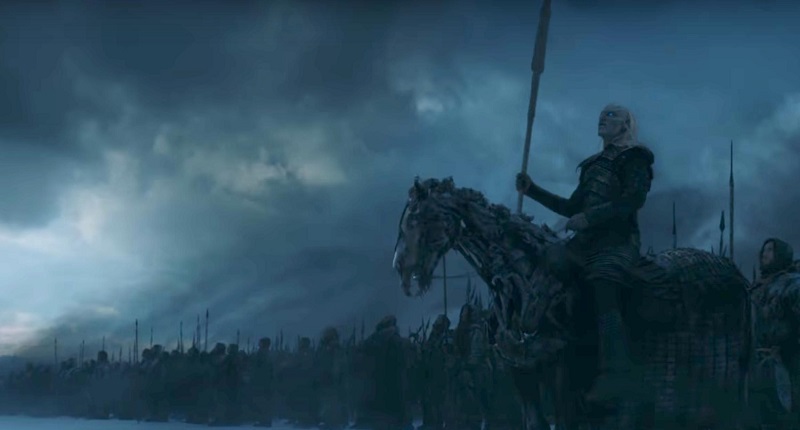
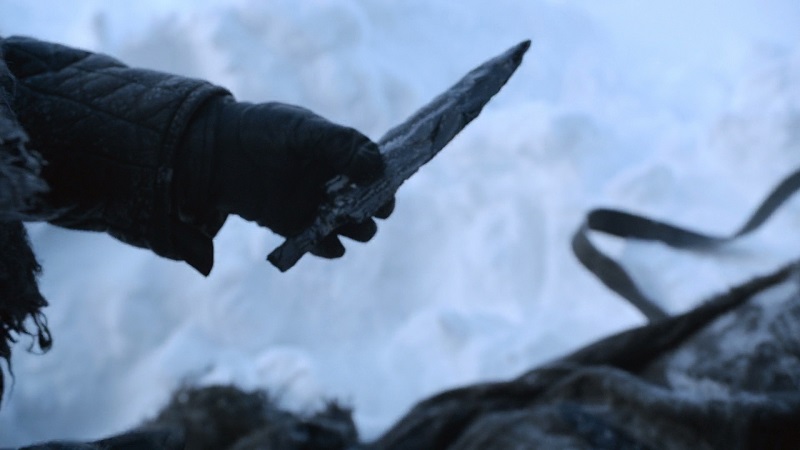
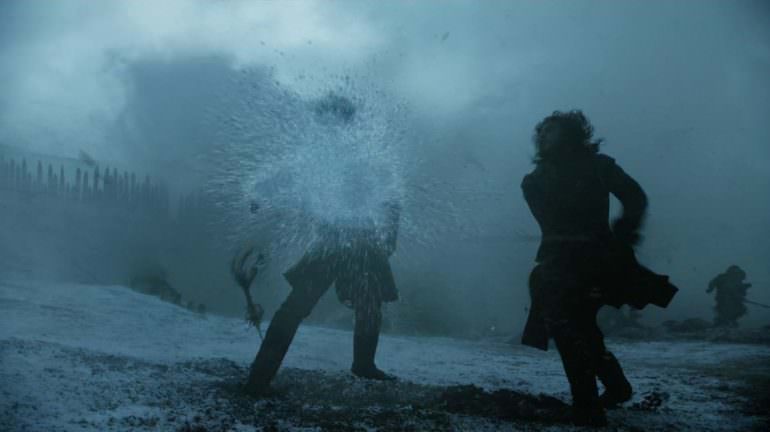

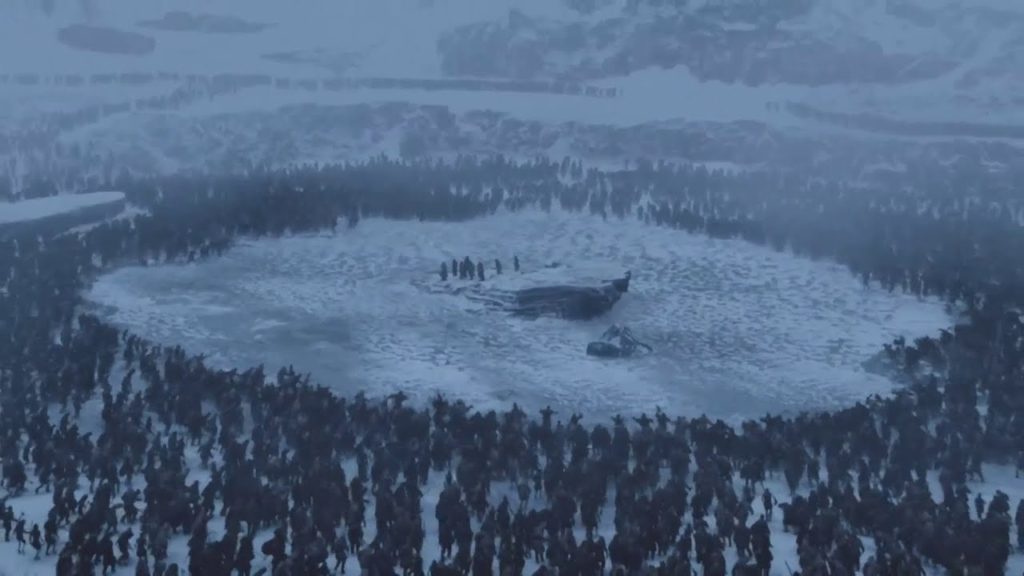

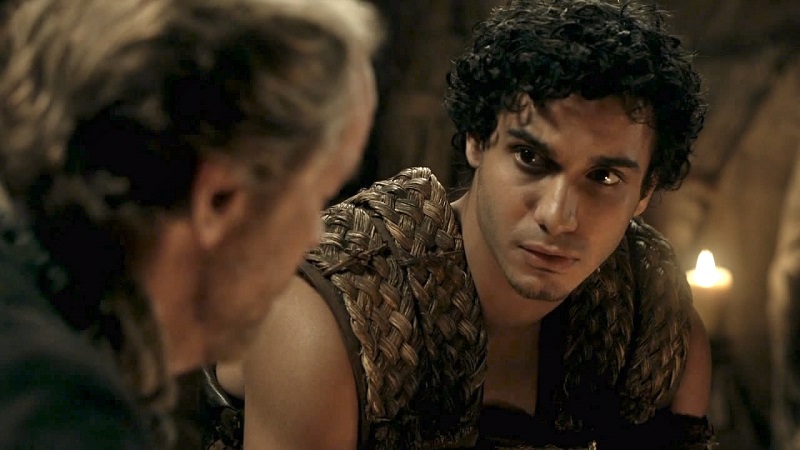
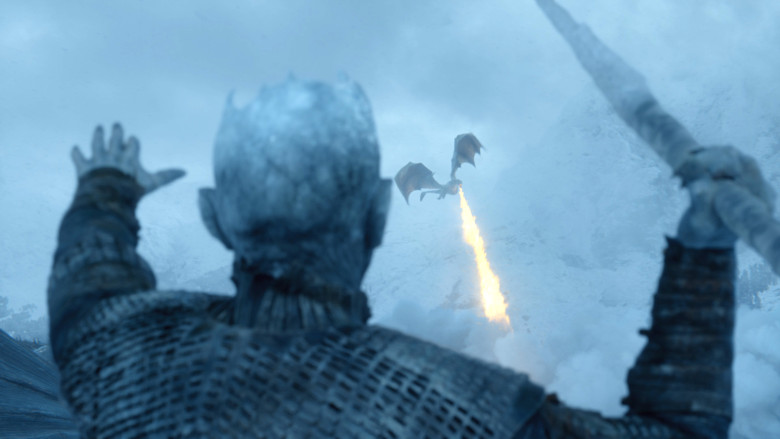
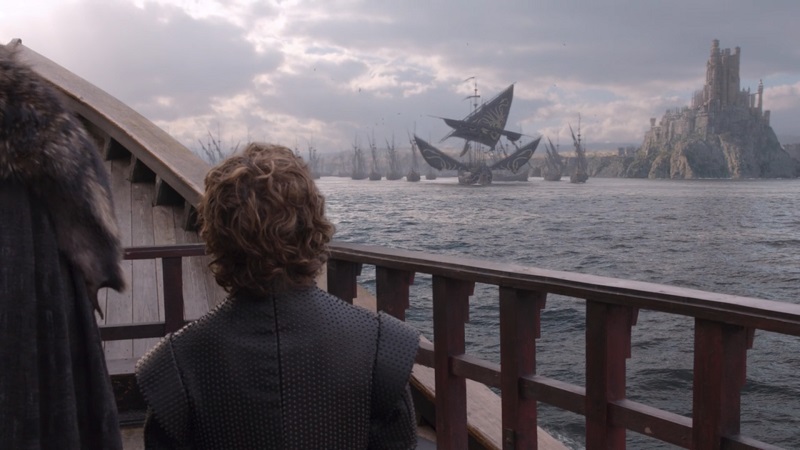
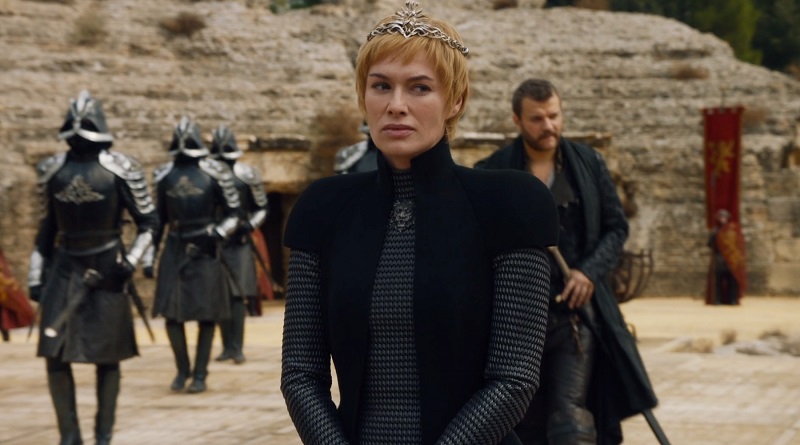
No comments:
Post a Comment